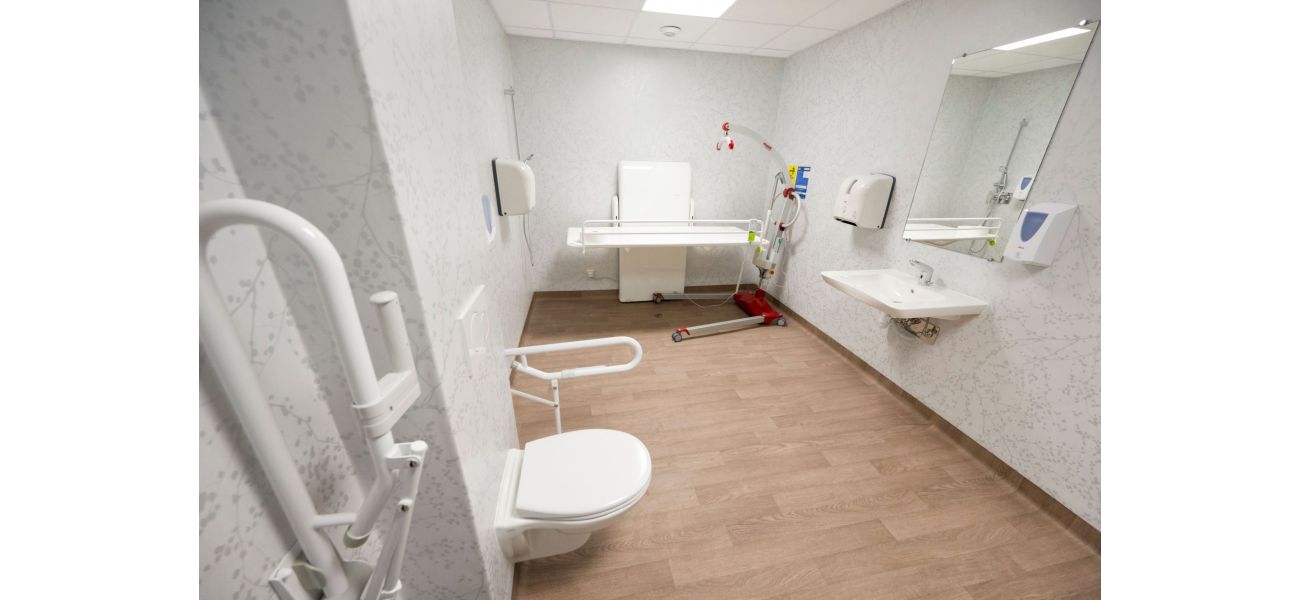Restrooms now have changing tables for adults with disabilities.
Some argue that the ADA does not explicitly demand these tables, but a new law will make them mandatory in most airports and states can implement building codes to include them.
October 4th 2024.

In the small town of Adair, Iowa, there is a rest area along Interstate 80 that has become a beacon of hope for individuals with disabilities and their families. This rest stop, like many others, has a blue-and-white highway sign indicating that it is accessible to people who use wheelchairs. However, this sign also features an additional icon, one that is not often seen on rest stop signs. It shows a person standing behind a horizontal rectangle, preparing to perform a task. This icon signifies that the rest area has a full-size changing table in the bathroom, making it an oasis for adults and older children who use diapers due to disabilities.
For Nancy Baker Curtis, whose 9-year-old son Charlie has a disability that can leave him incontinent, this changing table is more than just a convenience. It is a symbol of inclusion and accessibility, and it allows her to take her son out in the community without worrying about the lack of accessible restrooms. "It's a beacon of hope," she said. "I'm like, 'Oh my gosh, we're finally there.'"
The changing table itself is 6 feet long and can be lowered and raised with a handheld controller, making it easy to use for individuals of all heights. When not in use, it can be folded up against the wall, saving space in the bathroom. This table is just one example of a national effort to make public restrooms more accessible in places like airports, parks, arenas, and gas stations. Without these options, people with disabilities often have to resort to changing on bathroom floors, in cars, or even outside on the ground.
The lack of accessible restrooms can be a major barrier for individuals with disabilities and their families, causing them to limit their outings and stay home more often. "We all know somebody who's tethered to their home by bathroom needs," Baker Curtis said. She believes that her son deserves to be out in the community and not limited by the lack of accessible restrooms. This is especially true in rural areas, where bathroom options are often sparse.
Baker Curtis leads the Iowa chapter of a national group called "Changing Spaces," which advocates for adult-size changing tables. The group even offers an online map showing the locations of scores of places where these tables have been installed. While such tables are not explicitly required by the federal Americans with Disabilities Act, a new federal law will mandate them in many airports in the coming years. Some states have also adopted building codes that call for them in certain public buildings.
Justin Boatner, who lives in Arlington, Virginia, is a strong advocate for more full-size changing tables in the Washington, D.C. area. Boatner, who is 26, uses a wheelchair due to a disability similar to muscular dystrophy. He also uses diapers, which he often changes himself. He can easily lower the adjustable changing table to the height of his wheelchair, making it much easier and more hygienic than changing on the floor and then crawling back into his wheelchair. Boatner believes that it is important to talk about incontinence, even though it can be embarrassing. "There's so much stigma around it," he said.
While adult changing tables are still scarce, Boatner is optimistic that more will be installed. Without them, he sometimes has to delay changing his diaper for hours until he can get home, which can lead to serious rashes and discomfort. In Iowa, legislators have considered requiring adult changing tables in some public restrooms, but the bill was not passed. However, the discussion raised awareness and led to the Iowa Department of Transportation installing them in rest stops in 2022.
Michael Kennerly, the director of the department's design bureau, was not aware of the need for adult changing tables until an Iowan told him about changing a family member outside in the rain with only an umbrella for shelter. Others shared stories of changing their loved ones on bathroom floors, which Kennerly found to be appalling. Iowa has since committed to including adult changing tables in new or remodeled rest stop facilities. So far, nine have been installed or are in the process of being added, with more planned for the future. Kennerly estimates that it costs up to $14,000 to remodel an existing rest stop bathroom to include a height-adjustable adult changing table.
While some organizations offer portable changing tables for public events, most permanent adult changing tables are set up in "family restrooms," which are open to people of any gender. This is important because changing an adult is a very private and intimate task. It is also crucial for the tables to be height-adjustable, as it can be difficult to lift an adult onto a fixed-height table. Advocates hope that adult changing tables will become as common as infant changing tables, which were once rare in public bathrooms.
In Ohio, Jennifer Corcoran has been advocating for adult changing tables for over a decade and has seen interest in them rise in recent years. Her 24-year-old son, Matthew, was born with brain development issues and uses a wheelchair. Corcoran's lobbying efforts have led to the installation of adult changing tables at Dayton's airport and art museum, as well as libraries and entertainment venues. Ohio is also adding them to rest stops, which Corcoran believes is priceless because it makes it easier for people with disabilities to travel. "Matthew hasn't been on a vacation outside of Ohio for more than five years," she said.
Kaylan Dunlap serves on a committee that has worked to add changing table requirements to the International Building Code, which state and local officials often use as a model for their rules. As someone who uses a wheelchair herself, Dunlap understands the importance of having accessible restrooms. She believes that more public agencies and companies will voluntarily install changing tables, and she hopes that someday they will become a routine part of public bathrooms. "But I think that's a long way out in the future, unfortunately," she said. KFF Health News is a national newsroom that produces in-depth journalism about health issues and is one of the core operating programs at KFF, an independent source of health policy research, polling, and journalism.
For Nancy Baker Curtis, whose 9-year-old son Charlie has a disability that can leave him incontinent, this changing table is more than just a convenience. It is a symbol of inclusion and accessibility, and it allows her to take her son out in the community without worrying about the lack of accessible restrooms. "It's a beacon of hope," she said. "I'm like, 'Oh my gosh, we're finally there.'"
The changing table itself is 6 feet long and can be lowered and raised with a handheld controller, making it easy to use for individuals of all heights. When not in use, it can be folded up against the wall, saving space in the bathroom. This table is just one example of a national effort to make public restrooms more accessible in places like airports, parks, arenas, and gas stations. Without these options, people with disabilities often have to resort to changing on bathroom floors, in cars, or even outside on the ground.
The lack of accessible restrooms can be a major barrier for individuals with disabilities and their families, causing them to limit their outings and stay home more often. "We all know somebody who's tethered to their home by bathroom needs," Baker Curtis said. She believes that her son deserves to be out in the community and not limited by the lack of accessible restrooms. This is especially true in rural areas, where bathroom options are often sparse.
Baker Curtis leads the Iowa chapter of a national group called "Changing Spaces," which advocates for adult-size changing tables. The group even offers an online map showing the locations of scores of places where these tables have been installed. While such tables are not explicitly required by the federal Americans with Disabilities Act, a new federal law will mandate them in many airports in the coming years. Some states have also adopted building codes that call for them in certain public buildings.
Justin Boatner, who lives in Arlington, Virginia, is a strong advocate for more full-size changing tables in the Washington, D.C. area. Boatner, who is 26, uses a wheelchair due to a disability similar to muscular dystrophy. He also uses diapers, which he often changes himself. He can easily lower the adjustable changing table to the height of his wheelchair, making it much easier and more hygienic than changing on the floor and then crawling back into his wheelchair. Boatner believes that it is important to talk about incontinence, even though it can be embarrassing. "There's so much stigma around it," he said.
While adult changing tables are still scarce, Boatner is optimistic that more will be installed. Without them, he sometimes has to delay changing his diaper for hours until he can get home, which can lead to serious rashes and discomfort. In Iowa, legislators have considered requiring adult changing tables in some public restrooms, but the bill was not passed. However, the discussion raised awareness and led to the Iowa Department of Transportation installing them in rest stops in 2022.
Michael Kennerly, the director of the department's design bureau, was not aware of the need for adult changing tables until an Iowan told him about changing a family member outside in the rain with only an umbrella for shelter. Others shared stories of changing their loved ones on bathroom floors, which Kennerly found to be appalling. Iowa has since committed to including adult changing tables in new or remodeled rest stop facilities. So far, nine have been installed or are in the process of being added, with more planned for the future. Kennerly estimates that it costs up to $14,000 to remodel an existing rest stop bathroom to include a height-adjustable adult changing table.
While some organizations offer portable changing tables for public events, most permanent adult changing tables are set up in "family restrooms," which are open to people of any gender. This is important because changing an adult is a very private and intimate task. It is also crucial for the tables to be height-adjustable, as it can be difficult to lift an adult onto a fixed-height table. Advocates hope that adult changing tables will become as common as infant changing tables, which were once rare in public bathrooms.
In Ohio, Jennifer Corcoran has been advocating for adult changing tables for over a decade and has seen interest in them rise in recent years. Her 24-year-old son, Matthew, was born with brain development issues and uses a wheelchair. Corcoran's lobbying efforts have led to the installation of adult changing tables at Dayton's airport and art museum, as well as libraries and entertainment venues. Ohio is also adding them to rest stops, which Corcoran believes is priceless because it makes it easier for people with disabilities to travel. "Matthew hasn't been on a vacation outside of Ohio for more than five years," she said.
Kaylan Dunlap serves on a committee that has worked to add changing table requirements to the International Building Code, which state and local officials often use as a model for their rules. As someone who uses a wheelchair herself, Dunlap understands the importance of having accessible restrooms. She believes that more public agencies and companies will voluntarily install changing tables, and she hopes that someday they will become a routine part of public bathrooms. "But I think that's a long way out in the future, unfortunately," she said. KFF Health News is a national newsroom that produces in-depth journalism about health issues and is one of the core operating programs at KFF, an independent source of health policy research, polling, and journalism.
[This article has been trending online recently and has been generated with AI. Your feed is customized.]
[Generative AI is experimental.]
0
0
Submit Comment





